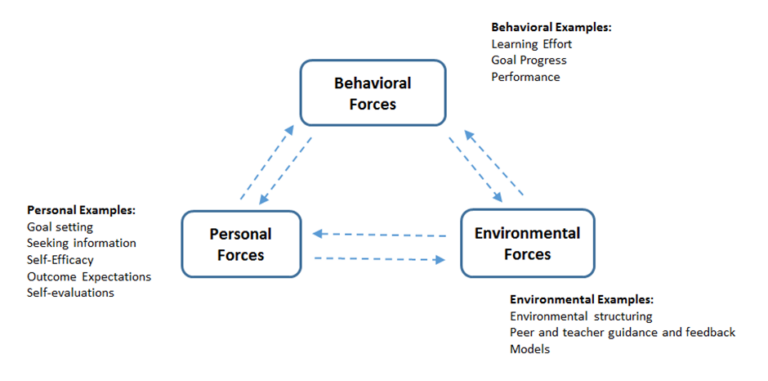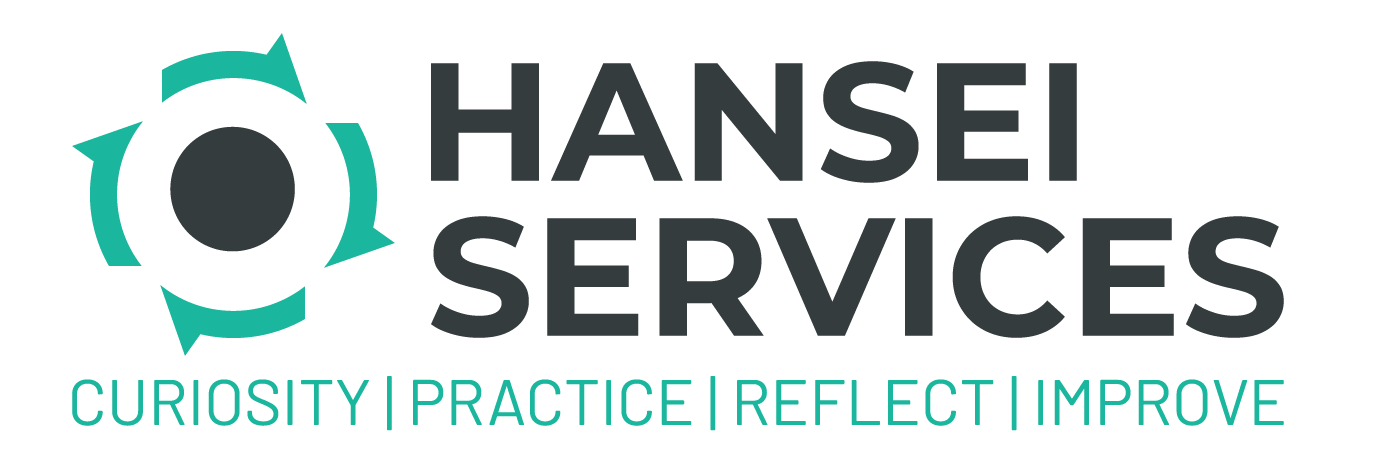Social Cognitive Theory is a model and theory of human determinism in which behavioral, personal and environmental forces interact bidirectionally as indicated in the diagram below (Bandura, 1986). It is a response to and rejection of the behaviorist notion that human behavior is merely a response to the environmental stimuli (Skinner, 1976). Social cognitive theory affords human beings the power to exert a measure of control over their lives including the capacity to choose new environments as well as the capacity to change the structure of their environments people find themselves in (Bandura, 1982, Bandura 1989, Pajares, 2003). It has high applicability to learning and teaching environments and the field of education in general as well as other fields of human activity (Bandura, 2012).

The world of a learner in a typical training room can be described using the model of triadic reciprocal determinism (on the left)
From a social cognitive perspective, learners can exert personal forces in their learning experiences, such as goal setting. Learners may also develop beliefs about their learning experiences, such as self-efficacy.
Teacher or trainer influence in the form of feedback would be an example of an environmental factor that can have effects on students and their beliefs and goal setting. Finally, student performance and effort is a behavioral force, which can be interpreted and have an effect on personal beliefs that can possibly lead to increased or decreased effort. It is within this social cognitive theory framework that Hansei Services design and deliver training
One of the most central constructs with broad effects in describing human behavior and that affects human agency is the construct called self-efficacy. Self-efficacy is defined as “beliefs in one’s capabilities to organize and execute courses of action required to produce given attainments” (Bandura, 1997, p. 3). Cultivating self efficacy can be done in four primary ways. As indicated in the diagram below, these influences are mastery experiences or performance attainments, vicarious modelling of performed behavior, verbal persuasion, and physiological states of being (Bandura, 1977). The literature abounds with studies confirming the forces and influences that can build a person’s self-efficacy.
Firstly, when students are given opportunities to perform skills successfully (mastery experiences), this has the most dramatic effect on self efficacy (Linnenbrink & Pintrich, 2003; Van Dinther, M., Dochy, F., and Segers, M., 2011; Pajares, Johnson, and Usher, 2007). Secondly, modeling is another powerful builder of self efficacy. This happens when students observe a model performing the skill they need to learn (Schunk & Gunn, 1985; Bandura, 1989; Schunk, and Zimmerman, 1995). Thirdly, verbal persuasion often takes the form of feedback to help gauge their performance level and capacity, adding accuracy and assurance to a person’s self-efficacy estimations (Schunk, 1989; Duijnhouwer, Prins, & Stokking, 2010;’Chan, and Lam, 2010 ). Feedback must be credible and specific however, attributing performance to specific efforts and strategy usage so that students can map out where they are going (Schunk, 1995).

Model of Self-Efficacy and Performance Influences (adapted from Bandura, 2012, image design, Brosnan, 2018)
Although the forces mentioned above, which lead to self-efficacy, are largely undisputed, there are more questions about how self-efficacy affects performance. The model above shows that self efficacy has a direct effect on performance as well as an indirect effect on performance through self-efficacy’s effect on the goals students set, and how students value the tasks and outcomes they might focus on. Students have the capacity to respond to and determine their personal responses to the environment. Ultimately, learning effort leads to performance which feeds back to a student’s self efficacy beliefs having further effects on the multiple variables in the model. The self-efficacy and performance relationship has been confirmed in multiple and varied research studies (Honicke, and Broadbent, 2016; Schunk, 1995; Altun and Erden, 2013). Other studies have shown that higher self-efficacy is associated with better self control and a growth mindset (Komarraju and Nadler, 2013).





